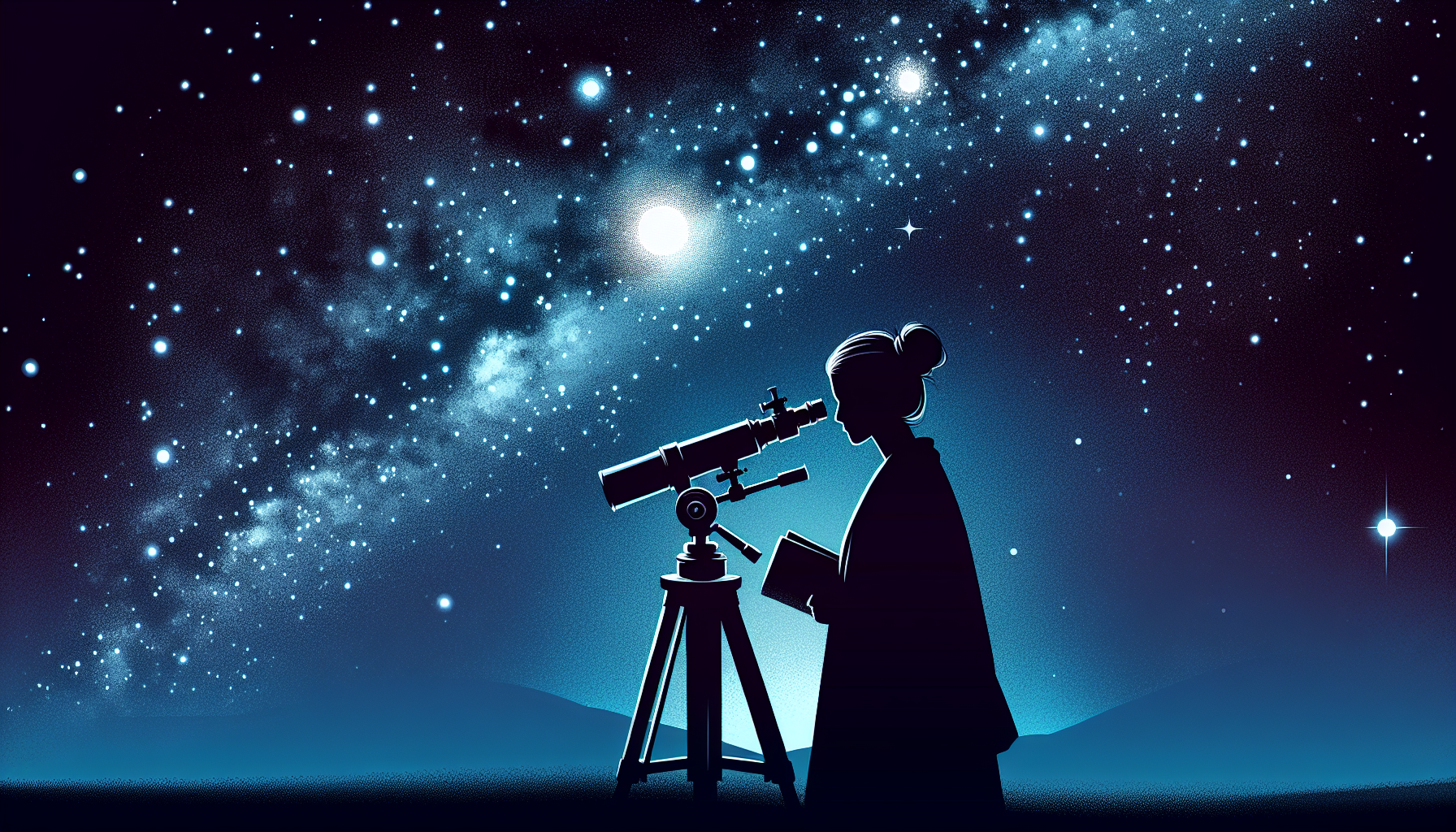Astronomy can seem overwhelming, right? With so many stars, planets, and galaxies out there, it’s easy to feel lost in the cosmos. You’re not alone—many of us have felt that same stargazing confusion when trying to grasp basic concepts or engage with the universe around us.
But don’t worry! If you stick around, I promise you’ll find a treasure trove of ChatGPT prompts specifically designed to make astronomy education fun and engaging. Whether you’re curious about constellations, planets, or even the mind-boggling realm of astrophysics, there’s something here for everyone.
Get ready to explore interactive prompts that will light up your understanding of the night sky and beyond. From fun projects to answers to those burning questions, let’s embark on this cosmic journey together!
Key Takeaways
- Astronomy can be complex, but engaging with it can be fun.
- ChatGPT prompts help clarify basic concepts, like the difference between stars and planets.
- Interactive prompts enhance understanding of constellations and stargazing techniques.
- Understanding our solar system is key; prompts guide exploration of each planet’s features.
- Learning about galaxies involves understanding their types and the role of dark matter.
- Astrophysics concepts, like the Big Bang, promote deeper knowledge of the universe.
- Fun prompts for kids make astronomy accessible and interesting through stories and crafts.
- Hands-on projects, like building a model solar system, can make learning memorable.

Top ChatGPT Prompts for Astronomy Education
Learning astronomy can ignite curiosity and wonder about the universe.
Utilizing ChatGPT is a fantastic way to explore and grasp complex astronomical concepts.
Here are some powerful prompts to help you or your students dive into the captivating world of astronomy.
Prompts to Explain Basic Astronomy Concepts
To build a strong foundation in astronomy, it’s essential to understand some basic concepts.
These prompts can help clarify common topics in astronomy.
- “Explain the difference between a planet and a star.”
- “What are the phases of the Moon, and how do they occur?”
- “Describe the basic structure of the solar system, including the Sun and its planets.”
- “List the different types of celestial bodies in the universe, such as asteroids, comets, and meteors.”
- “Explain the concept of gravity and its role in the solar system.”
Using these prompts, learners can easily clarify foundational astronomy terms and concepts.
Interactive Prompts for Starlight and Constellations
Understanding starlight and constellations can enhance your appreciation of the night sky.
The following interactive prompts can make learning about stars both engaging and fun.
- “How do you identify constellations visible in the night sky this month?”
- “Create a fun quiz about popular constellations and their meanings.”
- “What are the stories and myths behind three famous constellations?”
- “List five tips for stargazing and identifying stars with the naked eye.”
- “Describe the role of light pollution and its impact on observing the night sky.”
These prompts encourage hands-on exploration and open the door to the wonders of the universe.
Prompts for Learning About Planets in Our Solar System
Our solar system is an intriguing collection of planets, each with unique characteristics.
Use these prompts to dig deeper into the fascinating details of our planetary neighbors.
- “List the planets of the solar system along with their unique features.”
- “Create a comparison chart of the inner and outer planets, focusing on size, composition, and atmosphere.”
- “What is the significance of Venus’ greenhouse effect concerning climate change?”
- “Describe the main characteristics of gas giants versus terrestrial planets.”
- “Explain the importance of studying Mars in the context of potential human colonization.”
These prompts can spark discussions about planetary science and inspire interest in space exploration.

Prompts for Understanding Galaxies and the Universe
Understanding galaxies and the broader universe can feel overwhelming, but it’s fascinating to explore.
These prompts will help break down complex ideas into bite-sized pieces.
- “Explain the different types of galaxies, including spiral, elliptical, and irregular galaxies.”
- “What role do black holes play in the structure of galaxies?”
- “Describe the concept of dark matter and its impact on galaxy formation.”
- “Discuss how stars are born, live, and die within galaxies.”
- “What is the significance of the Hubble Space Telescope in our understanding of galaxies?”
These prompts encourage learners to explore not just the structure, but the dynamics and history of the cosmos.
Specialized Prompts for Astrophysics and Cosmology Topics
For those eager to dive deep into physics and the nature of the universe, astrophysics, and cosmology are essential fields.
These prompts cover crucial theories and concepts that explain our universe’s workings.
- “What is the Big Bang Theory, and what evidence supports it?”
- “Explain the concept of black holes and their effects on surrounding matter.”
- “Discuss the role of quantum physics in understanding the universe.”
- “What scientific evidence exists for the existence of dark energy?”
- “How does the cosmic microwave background radiation serve as evidence of the Big Bang?”
With these prompts, you can foster a deeper understanding of the universe from its inception to its complex structure today.
Fun Prompts for Kids to Learn Astronomy
Engaging children in astronomy can spark their imagination and a lifelong interest in science.
These fun prompts make learning about space exciting and accessible for young minds.
- “Create a funny story involving a planet and its moon.”
- “List five fun facts about the solar system that would impress a friend.”
- “Design a simple paper mâché model of your favorite planet.”
- “What are some popular children’s books about space that kids would love?”
- “Explain why astronauts float in space using simple terms for kids.”
These prompts can help children explore astronomy in a way that is enjoyable and engaging.
Prompts for Astronomy Projects and Activities
Hands-on projects and activities can make astronomy more memorable and fun.
These prompts will guide you in creating engaging educational projects.
- “Suggest a project for building a scale model of the solar system using everyday materials.”
- “What are some easy stargazing practices for beginners?”
- “Create a guide for a neighborhood stargazing night, including what to observe.”
- “Design a simple sundial to learn about the Sun’s movement.”
- “What community events can be organized to celebrate astronomy, like star parties or talks?”
These projects help learners apply their knowledge in practical ways, making astronomy come alive.

Prompts to Answer Common Astronomy Questions
When diving into astronomy, it’s natural for questions to arise, and the right prompts can help clarify these wonders.
Here are some typical questions along with prompts that you can use with ChatGPT.
- “What are the most frequently asked questions about astronomy?”
- “Explain the science behind why stars twinkle.”
- “Clarify common misconceptions about black holes.”
- “How do we know the age of the universe?”
- “What causes the seasons on Earth?”
Using these prompts can help break down complex ideas into more understandable concepts, making learning smoother and more enjoyable.
Educational Prompts for Famous Astronomers and Their Discoveries
Exploring the lives of famous astronomers can provide inspiration and context to astronomical discoveries.
Here are engaging prompts to uncover the stories behind these influential figures.
- “Who was Galileo, and what were his major contributions to astronomy?”
- “Discuss the impact of Isaac Newton’s laws on our understanding of motion in space.”
- “What discoveries did Johannes Kepler make, and how did they change our view of the solar system?”
- “Explore the life of Carl Sagan and his influence on public understanding of the universe.”
- “What was the significance of Edwin Hubble’s observations in the realm of galaxies?”
These prompts will help learners appreciate the significant contributions made by these astronomers and understand how their discoveries shaped modern astronomy.
Encouraging Prompts for Observing the Night Sky
Observing the night sky can be a magical experience, and these prompts can enhance your observational skills.
Here are some tips and questions to get you started on your stargazing journey.
- “What tools do I need for basic stargazing?”
- “List some easy-to-find constellations for beginners.”
- “How can I set up a stargazing schedule to catch celestial events?”
- “What precautions should I take while stargazing in various weather conditions?”
- “How can I start an astronomy club with friends or family?”
Using these prompts can inspire you to go out and observe the wonders of the night sky, making the experience even more enriching.
FAQs
Key concepts include the solar system, types of celestial bodies (stars, planets, moons), the universe’s structure, light years, and the electromagnetic spectrum. Understanding these fundamentals can enhance your exploration of astronomy.
To observe constellations, find a dark location away from city lights, use a star map or app, and give your eyes time to adjust to the dark. Familiarize yourself with prominent stars and their patterns.
Kids can create their own star maps, construct a model solar system, or observe the night sky with a telescope. Engaging in themed crafts and storytelling about planets can also make learning fun!
Famous astronomers include Galileo Galilei, known for his telescope advancements; Sir Isaac Newton for laws of motion and gravity; and Carl Sagan, who popularized astronomy through public outreach and media. Learning about their contributions is inspiring.
